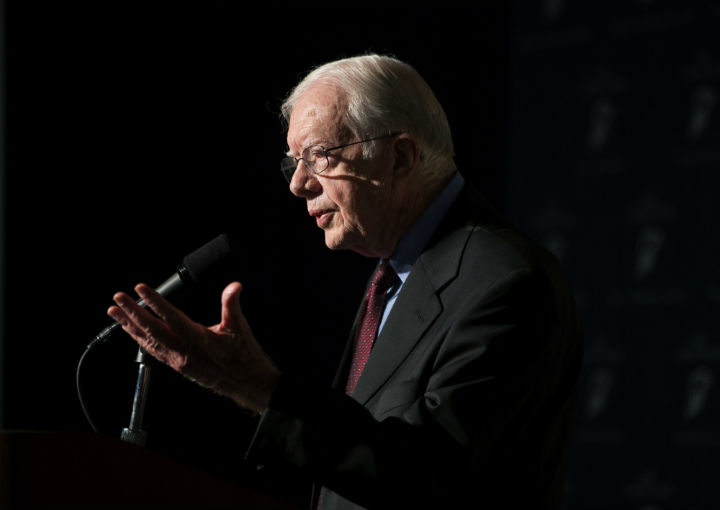VANCOUVER – Former U.S. president Jimmy Carter is calling for a peace conference and negotiations in order to resolve the conflict in Syria.

“The chemical attack should be a catalyst for redoubling efforts to convene a peace conference, to end hostilities, and urgently to find a political solution,” Carter said in a statement.
Comments from his organization The Carter Center, strongly condemned military action by the U.S. without a UN mandate.
“A punitive military response without a UN Security Council mandate or broad support from NATO and the Arab League would be illegal under international law and unlikely to alter the course of the war,” a statement from the organization read.
The comments from The Carter Center – an Atlanta-based non-partisan organization, founded by Carter and his wife Rosalyn – came prior to a Friday afternoon speech by Secretary of State John Kerry.
Kerry addressed the possible U.S. response to the Aug. 21 chemical attack, which he said killed at least 1,429 people, and left little doubt the U.S. will intervene militarily.
Kerry confirmed the U.S. will act on its own (still classified) intelligence, not waiting for the results of a UN inspection team’s investigation, but he said the U.S. government will discuss its options with the U.S. Congress, its allies and the American people.
READ MORE: Reaction to John Kerry’s comments on Syria chemical weapons attack
UN Secretary General Ban Ki-moon has also repeatedly called for a “peaceful solution” to the situation, which has reached a tipping point since Syrian opposition groups alleged the regime of Bashar al-Assad gassed suburban areas of Damascus.
How conflict resolution might work
Evan Hoffman, executive director of the Canadian Institute of Applied Negotiation (CIIAN), agrees mediation is still an option.
But, he said military intervention may have to be a factor in jump-starting negotiations.
“I agree with the thought that the use of force after all other options have failed makes sense… But, I would like to see force tied into the peace talks somehow or into a political solution.”
READ MORE: Assad vows to defend Syria, while UK Parliament votes down military intervention
He points to the 1995 Dayton Accords, which brought an end to the conflict in Bosnia-Herzegovina, and the use of military force paired with negotiation.
Hoffman explained how then-president Bill Clinton consulted with Richard Holbrooke – chief negotiator of the peace accords — about whether military force would help or hinder negotiations. Holbrooke agreed that it would make a difference in bringing about a political solution to the nearly four-year-long war.
“Military strikes at the moment, just for the sake of having military strikes, will not necessarily resolve a problem that’s going to require a political solution,” he said.
He points out there could be negative effects that military strikes could have on security throughout the region, not just on Syria.
But he believes the “threat of the use force” can sometimes be enough of a tool to ease aggression and “push the parties to coming to the table.”
Hoffman explained The Carter Center was able to achieve that in Haiti in 1994 when Carter was able to broker an agreement that held off a U.S. invasion.
In the case of Syria, Kerry reaffirmed the U.S. will not send soldiers into Syria and that this will not be another Afghanistan or Iraq.
The U.S. government’s plan is for limited military strikes, but it has not set a timeline.
READ MORE: Responsibility to Protect: Does the world have to help Syria?
READ MORE: World should have intervened in Syria a year ago: Dallaire
Hoffman said there are a number of options that could be presented at the moment to bring about negotiations, including proposing a temporary ceasefire.
“Often when you negotiate a ceasefire, it’s an initial step in a bigger process in eventually getting to talks,” he said.
“If you try to get the parties to talk too soon, if they’re too invested in pursuing forceful options, they won’t come to the table or they’ll come in bad faith,” he explained.
Hoffman said if there’s any hope of getting the regime and the opposition to the table, they’re both going to have “exhausted the option of pursuing violent means.”




Comments